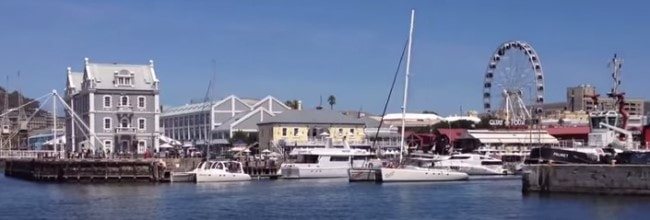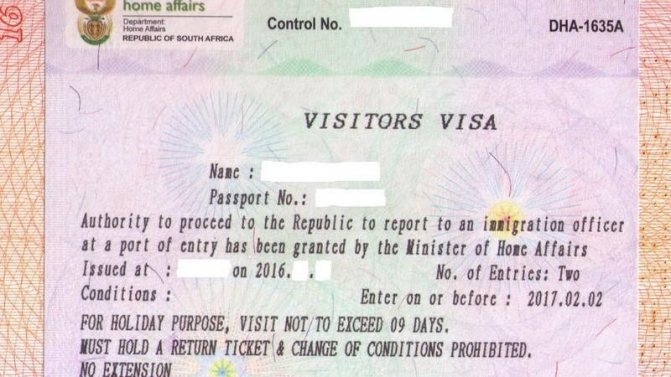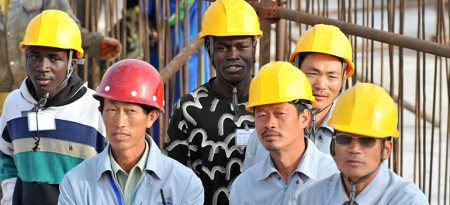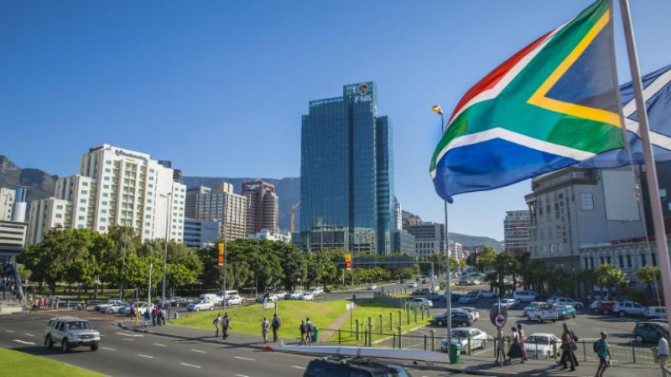Which African countries are the most suitable for employment?
For Russian citizens who care about their safety, it is recommended to get a job in South Africa, Egypt, Tunisia, Morocco, Botswana, Gabon, Ethiopia and Djibouti. It is better to come to other countries only for tourism purposes.
South Africa is the most civilized country in the above list. Although it has a number of internal problems, its legal system is most similar to the European one. Therefore, it will be easier for foreigners to live and work there than, for example, in Zimbabwe.
Living in other African countries has a number of restrictions related to the terrorist threat, rampant crime and the low level of social infrastructure. In addition, you need to understand that high-paying jobs in Uganda are simply not available to Russian citizens. The same applies to dozens of other countries.
Applying for a work permit
Getting a work visa in South Africa is difficult. Salaries in this country are not that low, so labor migration from Nigeria, Zimbabwe and other poorer countries is an acute problem there. Accordingly, South Africa has high unemployment, due to which the requirements for foreign specialists are becoming more stringent every year.
To obtain a work permit, a citizen of another state must present a valid employment contract, as well as a number of other documents.
The main difficulty is that many local companies refuse to enter into a work contract with anyone who does not have a residence permit in South Africa. It turns out to be a vicious circle.
The South African authorities have provided three types of work visa permits
- General work visa - a visa for employment under a labor contract for a period of up to five years. To obtain this document, confirmation is required that there are no South African applicants for the vacancy; diploma recognition; wage level is not less than the national average.
- Critical skills visa - issued to highly qualified foreign professionals with at least five years of experience in their specialty in a scarce and highly sought-after vacancy in South Africa. The visa grants the right to move to the visa holder and his family members. The visa is issued for a maximum of five years followed by registration of permanent residence.
- Intra-company visa - issued to representatives of international companies if they open new branches or subsidiaries in South Africa. The document is issued for four years and gives the right to transport your family.
List of documents
Applying for a work visa to South Africa requires submitting to the embassy:
- a valid passport;
- completed application form;
- copies of the employment contract;
- a diploma or certificate confirming professional education;
- certificates of absence of AIDS;
- two photographs 35 by 45 mm.
The submitted application and other documents are reviewed within 60 days.
A visa is refused if
- an incomplete package of documents was provided;
- the form is filled out with errors, blots, or provides contradictory or unreliable data;
- the level of financial independence of the applicant is insufficient in the opinion of the visa officer;
- having a criminal record or being under investigation at the time of consideration of documents at the consulate;
- violation of South African visa laws in the past.
In the first three cases, the applicant has the right to submit a second application. To resolve the remaining cases, an appeal is provided.
Related materials
00:07 — March 30, 2019
“They ran up from behind, stabbed me, threw me to the ground.”
The Russians went on a trip around the world without money and came across African bandits.
That evening a friend took me in, but I couldn’t stay with her for long. My parents called me to their place - they live in a big house in the Moscow region. But I had to go. Already on a trip to South Africa, in the city of Wellington, I found a friend. His name is Ian, he became my second father and also offered to stay. But my journey was not over yet. And in Zanzibar I was offered a house and life on a paradise island in the company of good people.
There is something to do here: you can build a hotel, systematize the work of a fishing village, open catering outlets and at the same time live on the shores of the Indian Ocean, enjoying every moment of this life. But I hugged Sudi and moved on. I took a last walk around the village, shook hands with the fishermen who had already become well known to me, and went out onto the road. The motorcycle stopped there, and we rushed, cutting through the air, to the Zanzibar International Airport.
Zanzibar Airport takes you back to the Soviet past. An old, uncomfortable hangar with minimal amenities, but I was glad to be in it, because the motorcycle ride to the airport turned out to be too extreme. My driver drove as if this was the last trip of his life.
I had three flights: Zanzibar - Dar es Salaam (Tanzania) - Nairobi (Kenya) - Addis Ababa (Ethiopia). During my short stay in each country, I wanted to learn at least a little about it. At the final point of my route at the Addis Ababa airport, Eshetu, the husband of my friend from St. Petersburg, was supposed to meet me.
He has been living in St. Petersburg for 13 years and importing coffee from Ethiopia. We didn't have clear agreements about how much time I could spend at Eshetu's house or what our plan was for that time. Therefore, it was important for me to understand what kind of country this is and how to behave there.
Between the shore of the wild Red Sea, and the shady forest of Sudan, a country is visible, scattered among four plateaus, similar to a resting lioness.
This is how the Russian officer and poet Nikolai Gumilev, who visited this country with an expedition, described Abyssinia-Ethiopia. Ethiopia is an ancient biblical kingdom from where, according to some experts, the Queen of Sheba came to Jerusalem. In the 4th century, Christianity came to Ethiopia, which determined the direction of its development.
What vacancies are in demand?
Working in a foreign country requires long-term residence in an unusual environment. Therefore, before such an important decision as looking for work abroad, we recommend that you familiarize yourself with the advantages and disadvantages of this step.
Work in Africa for Russians is represented by vacancies in the following areas that are actively developing in the country:
- mining;
- processing;
- economic;
- medical;
- construction;
- food;
- tourist;
- educational.
How to look for a job
You can adopt the European method of finding a job: go to the continent as a tourist and look for a vacancy on the spot. This option might work in Egypt, South Africa or Tanzania.
As for the rest of Africa, it is possible to contact international medical organizations in Russia, the USA, England, Germany or China. Here you can get a social package and a high salary.

International medical organization
If you are unable to contact recruitment agencies of international healthcare organizations, you can turn to the services of intermediary recruiting companies. In this case, finding a job through an intermediary will require the following:
- You will have to pay for the services of a job search agency. It is imperative to read the contractual obligations, which indicate the terms of employment and the amount of salary. No prepayment! Services should be paid upon completion.
- Before contacting a recruiting company, you need to find out reviews from clients who are already working as doctors in Africa. This way, you can save your money, which scammers are after.
- Carefully study the conditions for leaving to work abroad and the methods of returning to your homeland. Migration laws in African countries are much stricter than in Europe. You can end up in jail due to a minor offense or inattention. And the employer will have to rescue you from captivity.
You can start looking for work in Africa without leaving home. To do this, you need to go to the following online resources: BestJobs, Careers24, JobMail, Indeed.

Website screenshot indeed
Advantages and disadvantages of labor migration to South Africa
Advantages:
- low cost of housing - 100-150 thousand US dollars in an elite area;
- mild climatic conditions, proximity to the ocean;
- several thousand Russian immigrants, which will facilitate the process of adaptation to the new environment;
- respectful and friendly attitude towards the “white” population;
- low taxes (compared to European countries - two times lower);
- affordable and high-quality food products;
- favorable conditions for running your business;
- multi-ethnic population;
- variety of cultural and historical monuments and attractions.
Disadvantages include:
- high unemployment;
- difficulty of employment and migration;
- paid medical care and education.
- public transport is poorly developed;
- high crime in some areas of the city - slums;
- high level of corruption in the state apparatus:
- slowness is a feature of the mentality of the local population.
Be sure to take into account the peculiarities of the mentality of the local population in order to successfully adapt to an exotic lifestyle that is different from the European way of life.
All employment agreements in the Republic of South Africa are concluded on the basis of the Key Conditions of Employment legislation, which has been in force since 1997. This law regulates the rights and obligations of the employee and the employer, issues of labor protection and social justice.
Key requirements are put forward for foreign workers
- Availability of education, work experience and qualifications in the specialty.
- English language proficiency level confirmed by an international certificate.
- Having a work permit.
Working conditions for foreigners
Difficulties at home and at work are one of the main reasons that discourage Europeans from working in Africa. Even if we take large cities, their social infrastructure is in poor condition.
Another problem is the high level of crime. The white man is of increased interest to local robbers. Moreover, even in the relatively successful South Africa, a similar picture is observed. Many urban areas cannot be visited not only on foot, but even by car.
Housing and sanitary conditions also leave much to be desired. If in big cities you can still find a relatively comfortable apartment with air conditioning and a bathroom, then in the provinces the extreme begins.

Vaccinations
Before traveling to tropical countries in Africa, you must be vaccinated against malaria and other infections that may occur in this region. Lack of immunity to the diseases raging on the continent can be fatal for a European. Vaccinations can be done at a regular district clinic. A list of infectious diseases common in a particular region of Africa is available on the website of the Russian Foreign Ministry.
The standard of living in South Africa directly depends on the average salary, which differs by city:
- Johannesburg - 57,400 rubles.
- Cape Town - 54,300 rubles.
- Pretoria - 45,800 rubles.
- Alberton - 40,700 rubles.
- Durban - 40,100 rubles.
- Nelspruit - 27,100 rubles.
- Port Elizabeth - 25,400 rubles.
The average salary in South Africa is about US$1,120 per month. Qualified workers claim amounts from two to five thousand dollars a month.
Also, higher wages are offered by employers from large cities. Finding a job in megacities is easier and faster due to the concentration of large, including international, companies there.
The standard of living in South Africa is the highest of all countries on the African continent . The country is rich in mineral resources and precious stones. The state is actively developing the economic sector and occupies a strong position at the international level.

Related materials
00:02 — November 11, 2019
“Here the white tourist is a demigod or even half-devil”
The Russian decided to walk around the island of Zanzibar.
What came of it The first floor consisted of a garage for a couple of cars, a kitchen and a hallway - a small room with a table and a TV for receiving guests. Next, you need to climb the stone stairs to the second floor. This is my father's floor. Here is his room and a large dining room with a set of furniture, a large TV and a dining area, with a large comfortable balcony overlooking the city center. Well, the third floor is the mother’s floor. A large room has been made here for my mother and another room for Eshetu’s younger brother. She was the one I got.
Eshetu has 16 brothers and sisters. Later I found out that Eshetu’s own father died when he was two years old, the boys were taken into his home to be raised by his father’s brother and treats them as his own children. Therefore, Eshetu has two mothers: one is her own mother, who lives in the village, and the second is adopted. For Ethiopians, supporting relatives and taking care of family is a top priority. And in general, people in this country very quickly discovered for me some new, unattainable level of human love and care for each other.
For lunch they brought us a national flatbread called injera - a loose sour bread made from teff flour. Naturally, Injera does not contain gluten or animal products. These flatbreads accompany almost any dish, acting as a base. For the next ten days there was not a single meal that I ate without this flatbread. The flatbread was served with marinated beef and cabbage. I try not to eat meat or eat very little of it, but I didn’t dare refuse my hospitable and caring mother. Overall I liked the food - the taste was unusual.
After eating, Eshetu and I went for a walk around the city. In Kenya, Tanzania (even Zanzibar), Zambia and especially Zimbabwe, and in general everywhere in Africa, with the possible exception of Morocco and Egypt, walking after sunset is highly discouraged. This has consequences for the white tourist. And if in Botswana and Mauritania you can simply be robbed, then in Kenya, Nigeria and South Africa you can be kidnapped either for ransom or for organs. This is not an exaggeration; cases of such abductions are constantly recorded.
I read that in Addis Ababa there were cases of local tramps attacking Russians - they tried to rob them and threw stones at them, but Eshetu confidently declared that this was nonsense: “Perhaps in some areas of the city this can happen, but I I think that you wouldn’t walk around at night in Kupchino or Lyubertsy, especially if it’s clear to everyone that you’re a tourist.” I thought he was probably right.
We walked a couple of kilometers and sat down in a cafe. Eshetu ordered me a couple of sandwiches and more coffee. In general, we drank coffee every couple of hours. Ethiopians love this drink very much, so every cafe and every home has a coffee set, a special stove and always burning coals for making coffee. I was already drinking my fourth cup of coffee that day, and it had already gone to my head: I felt unnaturally cheerful and energetic.
A little later, Eshetu’s best friend named China joined our company. Eshetu arrived in Ethiopia just a few hours before me, so the meeting of friends was the first in the past four years. China didn't speak English well, but that didn't stop him from being sociable and hospitable. After finishing another cup of coffee, we went for a ride in his car around the city.
Addis Ababa is not only large (more than five million people live in the city), but also a truly unique city. This is the highest capital in the world. Its lowest point is at an altitude of 2326 meters, and its highest point is at an altitude of three thousand meters. The capital of Ethiopia has changed a lot in the four years that Eshetu was not here. Skyscrapers, business centers, and residential high-rises have grown. This city is rightly called the capital of Africa, and its name translates as “new flower”.
The main drawback of the city is the absence of at least some kind of master plan for construction and development: houses are being built everywhere. For me, a St. Petersburger, architectural chaos always catches my eye and spoils the whole impression. It’s hard for me to even love Moscow after St. Petersburg, let alone Addis Ababa...
Starting a business in South Africa
Businessmen planning to invest in Africa will find it useful to familiarize themselves with the features of starting a business in the most developed country of the entire African continent.
The South African government has launched financial programs to support new companies. The main condition for receiving financing is that the business undertakes to work for the development of the country's economic sector.
New businesses are supported by companies operating in different industries. Such programs not only support national enterprises, but also help foreign businesses, thus attracting investment.
To open a business in South Africa, two conditions must be met.
- First, the cost of a business in the state must be at least 40 thousand dollars.
- Secondly, the enterprise must provide jobs for at least 4 South African citizens.
A document confirming that the businessman has forty thousand dollars is attached to the application. These two documents are submitted to the Ministry of Internal Affairs. A short business plan is also attached to the package of documents. This procedure is carried out in order to check the criminal record of the entrepreneur.
After the stage of submitting documents to the Ministry of Internal Affairs, the entrepreneur must transfer the money to an account in any bank in South Africa. Thus, the businessman receives a residence permit in the country, and he can enter and open his own business.
Next, registration takes place in the Central Register of Companies of South Africa. Documents submitted for registration are reviewed for six months. The tax fee is paid along with the application and package of documents. Depending on the city, its size varies and reaches $500.

What Russian investors need to know about working in Africa
One of the companies I invested in has been operating in West Africa since the early 1990s. It is called Geoprospect, specializes in geological exploration and is based in the Republic of Guinea. It was founded by the famous Soviet geologist Vladimir Mamedov, who worked in Africa since the 1970s. I became his partner in 2012. In this article, I would like to describe what Russian entrepreneurs who are thinking about investing in Africa should keep in mind.
Unlimited prospects await you
Huge mineral reserves are transforming the continent literally before our eyes. Just 10 years ago, the capital of Guinea, Conakry, was, although quite large, a typically African city. During my first visit to Conakry, I flew into the city at night, and only three objects were illuminated: the airport, the presidential palace and one hotel in the entire city. Now there are more than two dozen hotels, some five-star, and the city glows at night, like any European or Asian metropolis. You can see how the service sector has changed, how cellular coverage is growing. New fields are being developed throughout Africa and transport infrastructure is being built. African countries are consistently among the leaders in economic growth rates. The countries that stand out are Ethiopia, Rwanda, Ivory Coast, Tanzania, Senegal and Ghana.
The space for growth is practically unlimited - in terms of the level of undeveloped deposits, Africa is perhaps the most attractive region in the world. It is interesting that the subsoil in vast Africa is often located very compactly - for example, half of the world's bauxite reserves lie in tiny Guinea.
There are prospects not only in mining. Much of the farmland is cultivated in traditional ways by local communities, and countries import food. Modern agricultural technologies can change this very quickly. For the same cellular coverage, Africa is firmly ranked last in the world. Until recently, in Sub-Saharan Africa it was only about 50%. For comparison: in Russia the figure reached 100% in the mid-2000s. There is also no chain retail trade on the Black Continent, just like in Russia in the 1990s. And this is the main advantage for Russian investors: in an atmosphere of fast-growing and consolidating markets, they feel like fish in water.
In principle, conditions for economic growth in African countries existed before. However, only now in many countries (I can definitely say about West Africa) local authorities have realized the direct connection between the growth of incomes and living standards of the population and the duration of their rule. Of course, there are still wars on the continent, which attract various adventurers. But overall there is more and more stability on the continent, and local authorities are interested in conscientious investors. From my point of view, right now the best conditions have arisen for investments in Africa - the optimal balance of profitability, investor interest (there is no queue lined up here yet) and risks.
Get ready for serious competition
However, there are already many people who want to make money from the extraction of African minerals and the accompanying growth of infrastructure and consumer markets. And the Chinese confidently took the first roles here, ahead of the traditional colonial powers (Great Britain and France) and the rest of the Europeans in terms of trade turnover and equaling the volumes of the United States.
Russian business is not particularly noticeable yet. Of course, Oleg Deripaska’s Rusal develops bauxite deposits in Guinea and produces alumina there, and Alrosa mines diamonds in Angola. But even within the BRICS framework, Russia still occupies a confident last place in trade turnover with African countries.
It is really difficult to compete with the Chinese: they have practically unlimited financial resources and do not hesitate to invest them in infrastructure facilities or repay external debt in exchange for the right to develop deposits. Local governments cannot refuse such proposals.
However, the rest of the world still has good chances. The Chinese are still forgetting about the PR component, which can be decisive for Africa. For example, they hardly attract the local population for work, preferring to bring labor from China - China towns have already begun to form in some African cities. Local residents look askance at this, and along with them, some politicians.
Learn local customs
The borders of many African countries were determined by colonial powers who cared little about traditional boundaries between tribes. As a result, almost every country has an explosive cocktail of two or more tribes that may be in a state of cold war with each other. And if the representative of your company belongs to the same tribe, and the official with whom he must negotiate belongs to his historical opponents, this will, at best, seriously complicate negotiations.
I was lucky in this regard: some of the leaders of Geoprospect have lived in Guinea for many years and are well versed in the local political and ethnic situation. We already know how to rearrange the dialogue depending on which tribe is in front of us. And I would advise beginners to study in as much detail as possible the history and customs of the country in which they are going to do business. It will be very useful to talk on the spot with representatives of all important local tribes, in no case relying on the opinion of only one of them.
A serious advantage of Russian entrepreneurs is that they do not need to explain why this is important. Europeans, and especially cosmopolitan Americans or self-centered Chinese, often simply do not pay attention to such things. We don’t need to explain why, when starting a project in Tatarstan, it would be good to know the traditions and alignment of political forces in this republic, and when starting a project, for example, in Ossetia, to be aware of the relations between Ossetians and Ingush.
Be philosophical about roads
Another problem that is easier for Russian people to be lenient about is African roads. Although sometimes Russians get nervous here too - if you think that in the Russian outback there is a problem with roads, you are mistaken. In most of Africa there are no roads in our understanding of the word, and a journey of 300–400 kilometers can take several days. Add heat and insects and you get a real extreme trip.
Keep in mind: any non-tourist trip can last much longer than planned, and you should have a supply of drinking water and provisions for several days, a satellite phone and sleeping bags for the entire crew. Of course, such conditions complicate logistics, but one inevitably has to adapt to the local rhythm.
Work with local people
We have never refused to hire local workers. The maximum size of Geoprospect's staff is up to 80 Europeans and about 1000 local workers. Now there are approximately 40 Europeans and about 250 Africans.
Rumors about the laziness and thievery of the local population are greatly exaggerated. Yes, petty theft of spare parts can happen, but on exactly the same scale as in the Russian outback or in an Asian country. In general, I can only give the most positive characteristics to local workers. Especially African blue-collar workers, although there is no talk of any kind of blue-collar workers there. Local mechanics, most of whom did not even receive specialized education, learned incredibly quickly and perfectly mastered the intricacies of the complex equipment used by geologists.
Plus, as I said, providing jobs to Africans can be your bargaining chip when negotiating with local politicians.
Prepare for malaria
Anyone who finds themselves in sub-Saharan Africa for any length of time will encounter malaria. There are unique people who have innate immunity to the disease, but such lucky people are literally 1–2%. There is another extreme - those who are constantly sick, they go back very quickly. The rest can only be patient.
Get used to being surprised
You can’t think of all the situations that could happen to an entrepreneur who decides to start a project in Africa, or to his managers. The continent is so large, diverse and colorful that miracles will happen to you almost every day. And the most popular explanation among locals for almost any process sounds like TIA - This is Africa.
What vacancies are in demand?
If you are looking for work in Africa for Russians, then the vacancies here are most suitable for mining industry professionals. These are oil workers, mining engineers, gold miners, deep drilling specialists and miners. Low-skilled personnel are not needed in Africa. This is a very poor region where the unemployment rate among the local population is very high.

Work in the medical field
In Libya, as well as in some other countries north of the Sahara, qualified doctors are in demand. It is not difficult for Russians to get a job as a doctor in Africa. Vacancies are usually offered for a year or even several years. Proof of diploma is not required. All that matters is specialized education and practical experience. The salary level for nurses is about $1000 with free accommodation. Doctors earn $1,500 and up.
Education
Teachers in Africa usually work as volunteers. It makes no sense to look for a teaching position in a regular school - the salary will be extremely low. In South Africa the situation is somewhat different, but it is unlikely that you will be able to get a job as a teacher there without retraining.
Diamond and gold mining
Construction
In some African countries, active construction of industrial, office and residential facilities is underway. Finding work on such construction sites is difficult. There are chances if the employer is a foreign company.
Engineers
If you do not take into account the most developed mining industry, you can find work as an engineer in the construction or reconstruction of any infrastructure facility. For example, railway lines. But we must take into account that such vacancies attract only those foreigners who actually have an acutely scarce specialty.


